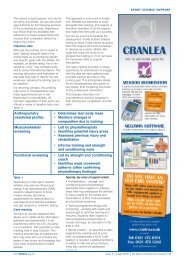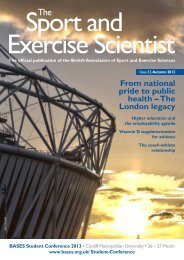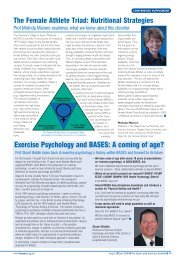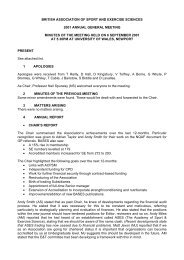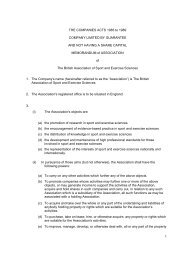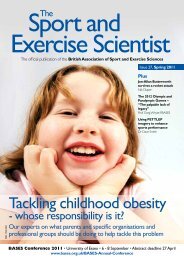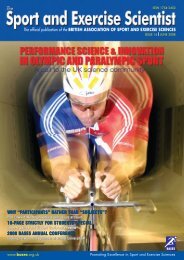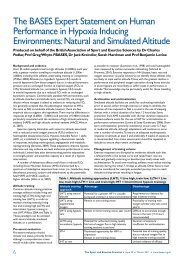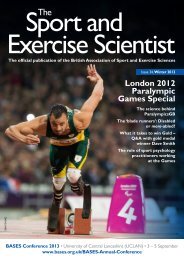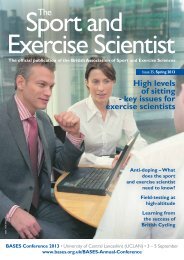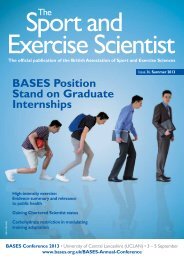Issue 31 Spring 2012 - Bases
Issue 31 Spring 2012 - Bases
Issue 31 Spring 2012 - Bases
You also want an ePaper? Increase the reach of your titles
YUMPU automatically turns print PDFs into web optimized ePapers that Google loves.
televised elite sport is a totally different behaviour from healthenhancing<br />
physical activity! One mechanism that many believe<br />
could work is that of role models. We have well meaning and often<br />
inspirational people such as Dame Kelly Holmes and Colin Jackson<br />
CBE espousing the benefits of sport and the legacy of the Games.<br />
But the politicians have no idea of the mechanisms that translate<br />
watching such role models into activity. The psychologist, Al Bandura<br />
(of ‘self-efficacy’ fame), has written a great deal on ‘modelling’<br />
effects and he is quite clear. The best effects (at least for gaining<br />
confidence to participate in the same behaviour) are when the<br />
person is watching a model similar to themselves, and sometimes<br />
overcoming adversity. On this basis, exciting, and entertaining as the<br />
Usain Bolts are to watch, he will not inspire me, or indeed many<br />
young people, to be physically active on a daily basis, such as taking<br />
up a different sport at school, or walking instead of car travel. He<br />
might encourage a few fast runners to seek more help in becoming<br />
sprinters, but those individuals will soon decide whether it’s for<br />
them and evidence suggests that enthusiasm will be short lived.<br />
Participation in sprinting will not affect public health.<br />
Maybe we should simply enjoy the Olympics for what they are –<br />
a fantastic spectacle of elite sport. Since I can’t get any tickets, I will<br />
be watching on TV, attempting not to be too sedentary, and then<br />
exercising afterwards. The two events will be unrelated!<br />
Prof Marie Murphy FBASES, Professor of<br />
Exercise and Health, University of Ulster<br />
Despite the rhetoric it seems unlikely that London<br />
<strong>2012</strong> will increase the physical activity of UK<br />
citizens. When attempting to attract the Games,<br />
bid teams get carried away with grandiose claims<br />
of the legacy that they will leave for the city, the<br />
country and indeed the world, but as Ken has pointed out there is<br />
no evidence that previous Games have increased physical activity<br />
and no reason to believe that London will be any different in this<br />
regard.<br />
For the 700,000 of us not fortunate enough to get hold of a<br />
single Olympic ticket, we will be treated to 17 days of coverage<br />
including 24 live streams with every event being broadcast.<br />
The advances in technology will mean that we will have greater<br />
opportunity than ever to watch the Games on our TVs, laptops<br />
and smartphones. It seems likely, with the Olympics occurring in<br />
our time zone, and with such extensive television coverage, that<br />
as a nation we will watch the Games more than any other, but of<br />
course this screen time will probably be sedentary time. Moreover,<br />
there is some evidence that this will be accompanied by more snack<br />
consumption and a net increase in energy intake over expenditure<br />
(Cleland et al., 2008)! Retail figures show that during the 2006<br />
World Cup, there were huge rises in sales of savoury snacks, soft<br />
drinks and alcohol (www.betterretailing.com/2010/04/managingyour-store/money/world-cup-figures-mean-indies-set-to-cash-in/),<br />
and I am sure that the supermarket chains have sophisticated<br />
Olympic marketing plans to encourage us to consume more food<br />
and drink while watching lean athletes perform their amazing feats<br />
of sporting excellence.<br />
However, I am perhaps one of the ‘zealots’ to which Ken refers<br />
who act more on a ‘leap of faith’ than evidence when it comes<br />
to this particular issue. To balance the ‘Waldorf and Statler’ view<br />
presented by Ken and Stuart I take the stance that change in a<br />
population is made up, inevitably, of individual change and for me the<br />
Olympics provides the promise of inspiration for a new generation<br />
of sportsmen and women. Many of you reading this will have taken<br />
your sporting inspiration from a memorable Olympic performance.<br />
For me it was Olga Korbut’s performance in the 1972 Olympics in<br />
Munich that led me to gymnastics club and eventually into a life and<br />
career totally dominated by sport and physical activity. So although<br />
physical activity at a population level may not increase as a result of<br />
the Games, I am confident that London <strong>2012</strong> will leave a lasting if<br />
perhaps difficult to measure physical activity and sporting legacy for<br />
many individuals in the UK and around the world!<br />
Hope remains…<br />
Although our experts are not convinced that a measurable legacy<br />
will be achieved, the opportunity still exists, and strategies have<br />
been proposed (Weed et al., 2009). The Olympics might also have<br />
positive influences in other areas, such as promoting national<br />
cohesion. For example, in 1995, South Africa hosted and won the<br />
rugby union World Cup. After the dismantling of apartheid and<br />
years of international sporting isolation, South Africa at last had an<br />
opportunity to be ‘centre stage’ in world sport. The team adopted<br />
the slogan ‘one team, one nation’, and it was widely reported that<br />
the event substantially helped in the creation of a ‘feel good’ and<br />
united effect in a country where racial discrimination had created<br />
such division.<br />
Compiled by: Dr Garry Tew<br />
Senior Research Fellow, Sheffield Hallam University<br />
References<br />
Cleland, V.J., Schmidt, M.D., Dwyer, T. & Venn, A.J. (2008). Television viewing<br />
and abdominal obesity in young adults: is the association mediated by food and<br />
beverage consumption during viewing time or reduced leisure-time physical<br />
activity? American Journal of Clinical Nutrition, 87, 1148-1155.<br />
Department for Culture, Media and Sport (2008). Before, during and after:<br />
making the most of the London <strong>2012</strong> Games.<br />
Sport England (2011). Active People Survey 5. Available: www.sportengland.org/<br />
research/active_people_survey/aps5.aspx<br />
Weed, M., Coren, E., Fiore, J., Mansfield, L., et al. (2009). A systematic review<br />
of the evidence base for developing a physical activity and health legacy from the<br />
London <strong>2012</strong> Olympic and Paralympic Games. Department of Health.<br />
Have Your Say:<br />
Share your comments and opinions on<br />
this topic - www.twitter.com/basesuk<br />
Department of Sport<br />
and Exercise Sciences<br />
Students are able to study the following programmes on a full-time or<br />
part-time basis:<br />
MSc Sports Sciences (Biomechanics)<br />
MSc Sports Sciences (Nutrition)<br />
MSc Sports Sciences (Physiology)<br />
MSc Sports Sciences (Strength and Conditioning)<br />
MSc Sports Sciences (Psychology)<br />
MSc Sports Sciences (Performance Analysis)<br />
MPhil and PhD research programmes<br />
are also available<br />
Programme Enquiries:<br />
MSc Sports Sciences<br />
Programme Leader, Dr Ceri Nicholas (c.nicholas@chester.ac.uk)<br />
For further details, go to www.chester.ac.uk/sport<br />
MPhil and PhD Research Degrees<br />
Opportunities for MPhil and PhD programmes of study are also available in the Department of<br />
Sport and Exercise Sciences under the supervision of highly qualified and experienced staff. For<br />
more information and details of the application process, please visit our website<br />
www.chester.ac.uk/departments/ses/research/phd-apps<br />
or contact Dr Ceri Nicholas on 01244 553470 or email c.nicholas@chester.ac.uk<br />
The Sport and Exercise Scientist n <strong>Issue</strong> <strong>31</strong> n <strong>Spring</strong> <strong>2012</strong> n www.bases.org.uk<br />
23



